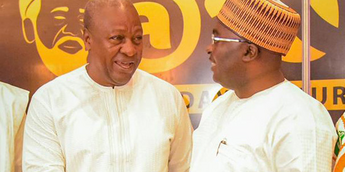Ghana’s ruling New Patriotic Party (NPP) has elected the current vice president, Mahamadu Bawumia, as its candidate for the 2024 race. A technocrat and trained economist, Bawumia will face John Dramani Mahama, a populist who was president from 2012 to 2017.
Maintaining stability and bolstering the economic recovery will be at the forefront of voters’ minds. It is easy to see why these issues are so critical to voters simply by looking at what is going on in the region around Ghana. Under President Nana Akufo-Addo, Ghana has been a stable and consistent buttress against the instability and chaos that has torn through West Africa and the Sahel.
Since 2020, coups have overthrown established leaders from Sudan on the Red Sea to Guinea on the Atlantic, with Mali, Chad, Burkina Faso (twice), Gabon and Niger all experiencing regime change. At the same time rising Islamic extremism, often linked to criminal activity, has thrived in the power vacuums left by weakened administrations, allowing gangs to control large swathes of territory and target border settlements in more prosperous neighbours like Ghana.
The EU recognises the importance of stability in Ghana and is evidently concerned about contagion. At the end of last month, the EU gave Ghana over 100 armoured military vehicles that had been seized from a ship off the coast of Libya, part of a €20 million support package for the country’s military to secure the country and stabilise the region.
The EU’s concern is well placed, as regional instability in West Africa has direct ramifications for the EU. After a substantial drop in the number of irregular arrivals to the EU during the pandemic, the number of boats crossing the Mediterranean laden with migrants from North Africa is growing fast. Data from the International Organization for Migration (IOM)’s Displacement Tracking Matrix records over 246,000 illegal arrivals in Europe so far in 2023, with Guinea the most common country of origin. This compares to just under 100,000 arrivals in 2020, when Guinea was not even in the top 10 countries of origin.
In Ghana, the next choice of president will be critical to preserving stability. In his previous presidency Mahama, who was educated in Moscow, prioritised relations with Iran and other non-aligned states. More recently, he claimed that the Russian invasion of Ukraine had no impact on Ghana’s economic state, despite the direct impact on fuel and wheat prices caused by the war. He also berated Kristalina Georgieva, the director of the IMF, for saying that the main driver of the weakened economic situation was Covid-19 and the Russia-Ukraine conflict. Mahama preferred instead to politicise the issue by claiming that these global events were secondary to mismanagement by the NPP.
Mahama’s wayward claims were tinged with irony. While President, his own government had been the subject of numerous allegations of corruption, including via Airbus, which was fined a record £3 billion by a London court after admitting that it had paid huge bribes to win contracts in several countries, including Ghana during Mahama’s NDC administration.
His government was accused of awarding over-inflated contracts to Mahama’s brother, while also overpricing a single-sourced power turbines deal by $350 million. The then President also admitted to receiving a Ford vehicle as a gift from a construction firm bidding from a substantial government contract.
This populist streak is a style of leadership that the region can ill afford. Bawumia, by contrast, is a technocrat – a trained economist and central banker with no links to any scandals. His initiatives under the Akufo-Addo government – including a major push towards digitalisation – have been roundly applauded. The Ghanaian economy, battered as it has been by both war and pandemic, is showing signs of recovery, with GDP growth beating analysts’ expectations and inflation beginning to retreat. Should this continue into next year, Bawumia’s position with the electorate will be stronger.
What is clear is that, in order to keep Ghana stable, there needs to be a consistent and coherent economic plan that bolsters growth and opportunity among the increasingly young voting population. Without such a plan, the risk of instability increases, with a negative impact on Ghana and the wider region that will be felt keenly on the streets of in the EU.
NOTE: The author, Louis Auge is a Paris-based freelance journalist and political commentator at EU Reporter.

